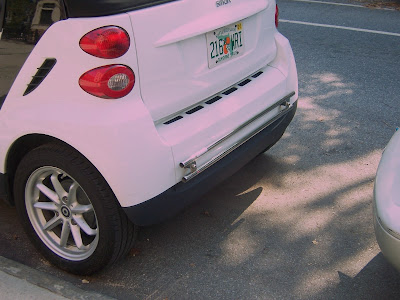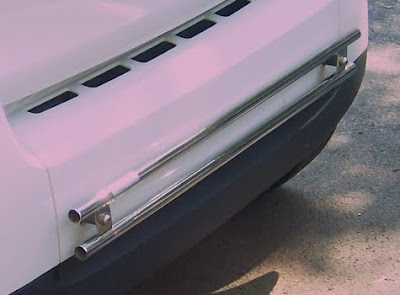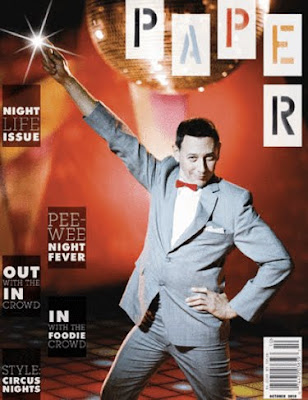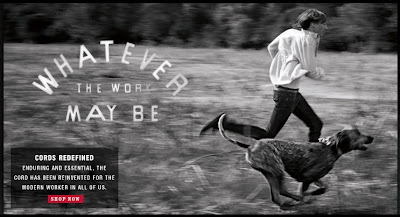
Throughout the late '90s and into the aughts bumpers faded away, as if whiling away their golden years hidden in nursing homes, and in recent years a new generation of half-assed youth—"Bumper Badgers" and bolt-on battering rams—took their place. It's like the cycle of life, death and rebirth, played out in steel, chrome and fiberglass. The old crop decays and is subsumed by the earth (or chassis, in this case), and becomes the fertile soil from which new life springs forth.
Or some shit like that. I'm sorry, I've been combating recent sleepless nights with a bottle of Percocet and the DVD boxed set of the Discovery Channel's mesmerizing, epic, and brutal Planet Earth, so my thoughts are "trending" toward grim and ponderous (if a bit warm and fuzzy). In my impaired state I can't really even take credit for that previous paragraph—I was just taking dictation from the voice of Sigourney Weaver in my head.
As I was saying, I've been on a bit of a roll with topics of the automotive variety. Today, hopefully, I can get the last of that out of my system so that hereafter (not "the great hereafter," mind you, just the garden variety "hereafter," which really just means "after") I can return to other topics, like ads about cars.
Other than the metal railings that adorn both ends of that Smart car from the other day, I noticed one other remarkable thing.

In an average sized parking space that car has oodles of room all around it. There's so much room there, you could probably park another Smart car. Unfortunately this is the exception to the rule; we're still in the age of SUVs, which as ages go is proving to be quite epic. Which is to say tedious and neverending, like Stanley Kubrick's Barry Lyndon.
Being this the age of Sport Utility Vehicles, I recently had occassion to drive a "Mercury Mariner" SUV, the occassion being that I temporarily procured it for the purpose of transporting "flat packed furniture." While parallel parking this vehicle, I was surprised to find a beeping noise that alerted me to my proximity to the car behind me. With the increasing or decreasing distance to an object, the frequency (and annoyingness) of the beeps increased or decreased. While somewhat irksome, this feature simplified the task of parking quite a bit. (It also obviated the need for my usual parallel parking routine; depending on how nice of a vehicle I'm driving, I'll either get out of the car to repeatedly gauge the margin of safety, or I'll just ram the car behind me once to break the unbearable tension and confirm exactly how far back I can go.)
And that was a Mariner from a couple years back. The newer ones now have video and sonar and a bunch of other junk:
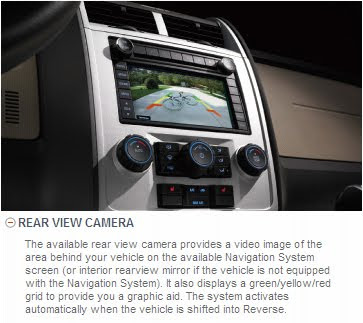

Things certainly have changed. Parallel parking back in the good old days—the 1970s, for instance—consisted of boat-sized old Pontiacs, Cadillacs, and Chevy Novas engaging in a lot of back and forth, fender-knocking movements. (I suspect this is where the term "bumping uglies" originated.) In the current age of delicate glossy finishes, high-tech gadgetry, and overall sanitized living, parallel parking is becoming a matter of precise, computer-assisted micro-driving with cameras, lights and audio-alerts. These are designed to prevent your vehicle from ever touching another car's bumper, thus eliminating the risk of three horrific potential outcomes: setting off somebody's car alarm; your BMW contracting VD from the neighboring Hyundai; or enraging the driver of the impacted car, who has been sitting in his driver's seat for the last 20 minutes with the engine running for no discernable reason (and without even the decency to curb his own emissions by running a hose from the tailpipe back into the passenger compartment).
Speaking of car alarms, I thought that horrifying trend had died out, but lately again I'm finding myself tortured by that familiar curbside wailing. Is it possible they did go away briefly, only to return like so many other retro fads? It's not such a far-fetched notion. In fact, I'm beginning to think that were I to go out "clubbing" (something I rarely have time for, as it interferes with my usual after-dinner chores like ironing my bow ties) I would find that these days kids are dancing around in their high-top Nikes, wearing skinny jeans with leg warmers and setting off car alarms. (Y'all ready for this? Weee Oooo Weee Oooo Bwooooop! Bwooooop! Eee-rrr-eee-rrr bwip bwip bwip)
Finally, to conclude my trend of automotive riffery, I will say that now as in the past cars are irritating, but they're hands down better than Planet Earth DVDs for procuring flat-packed furniture. Also Percocet is handy—not so much for procuring furniture, but just in general.
Anyway, where was I? Right—disc 5, coming right up.



